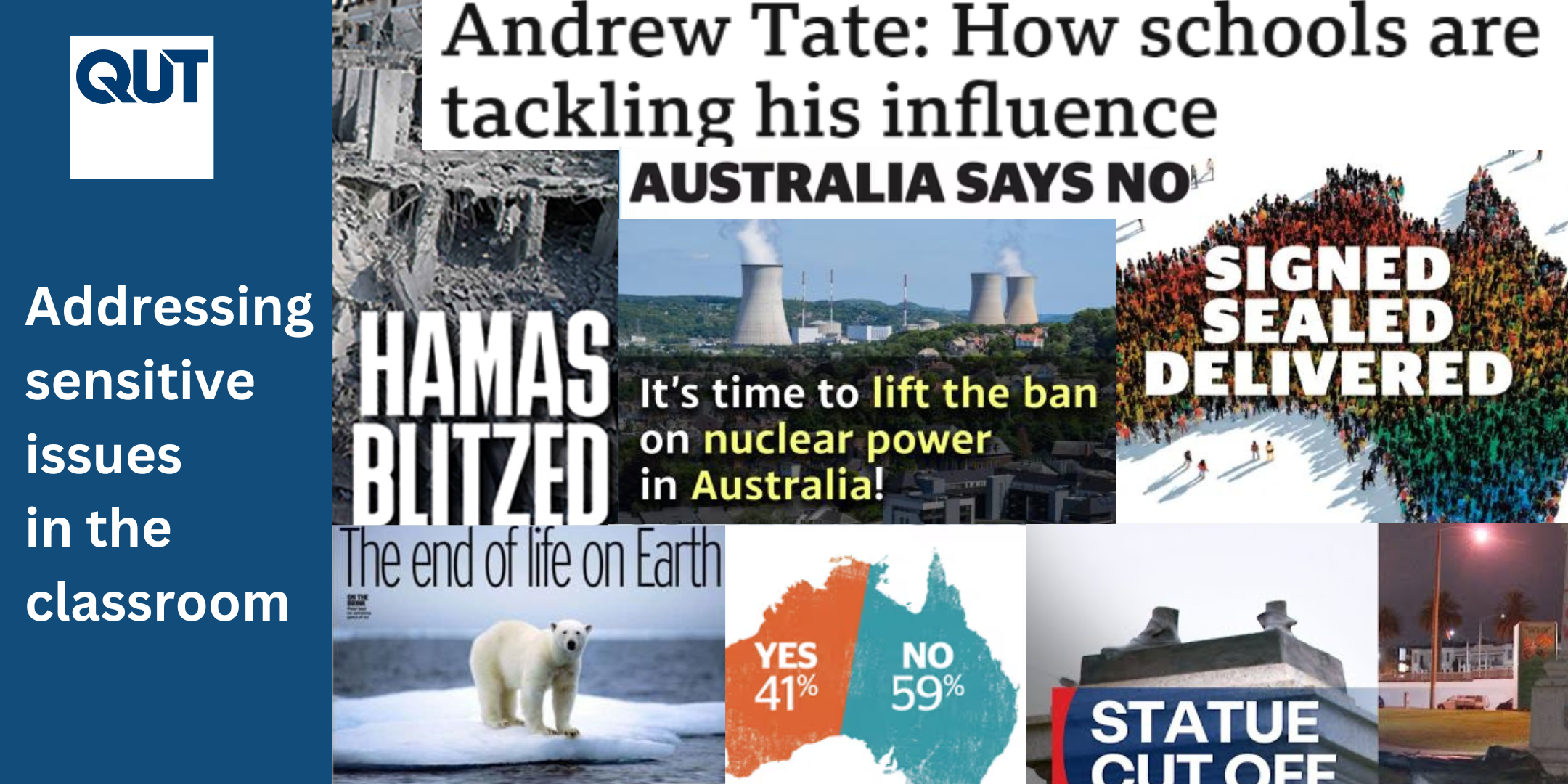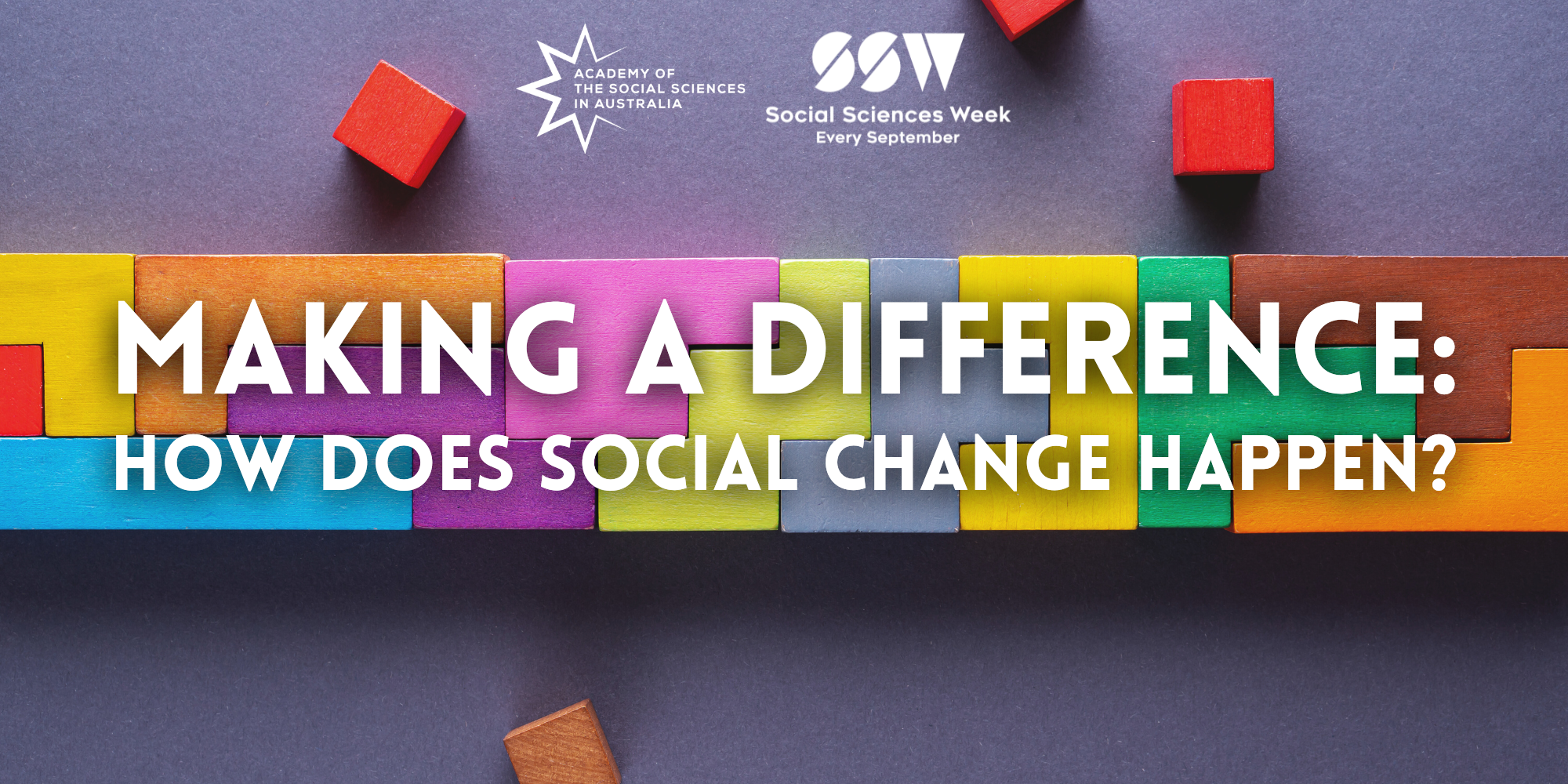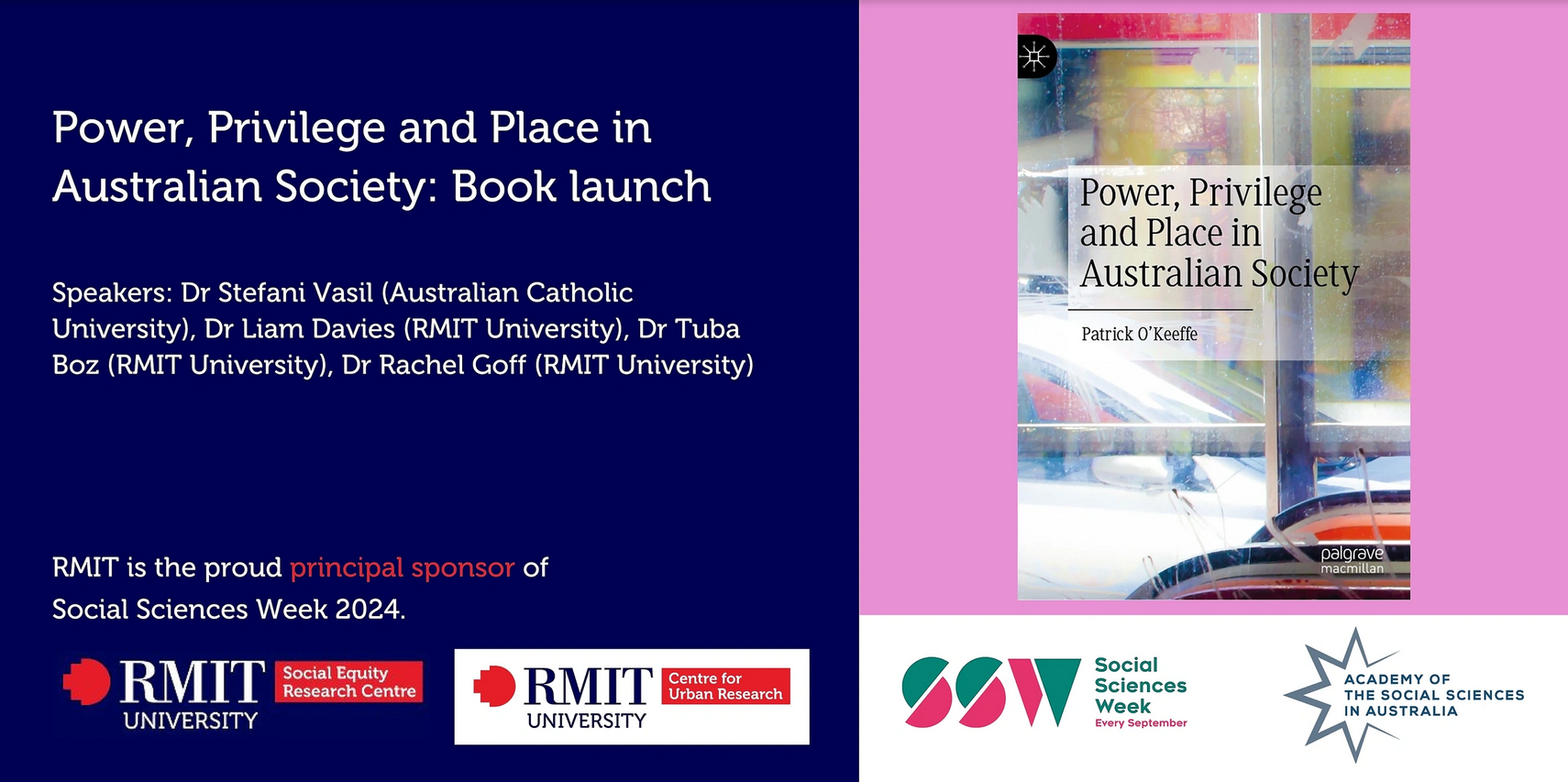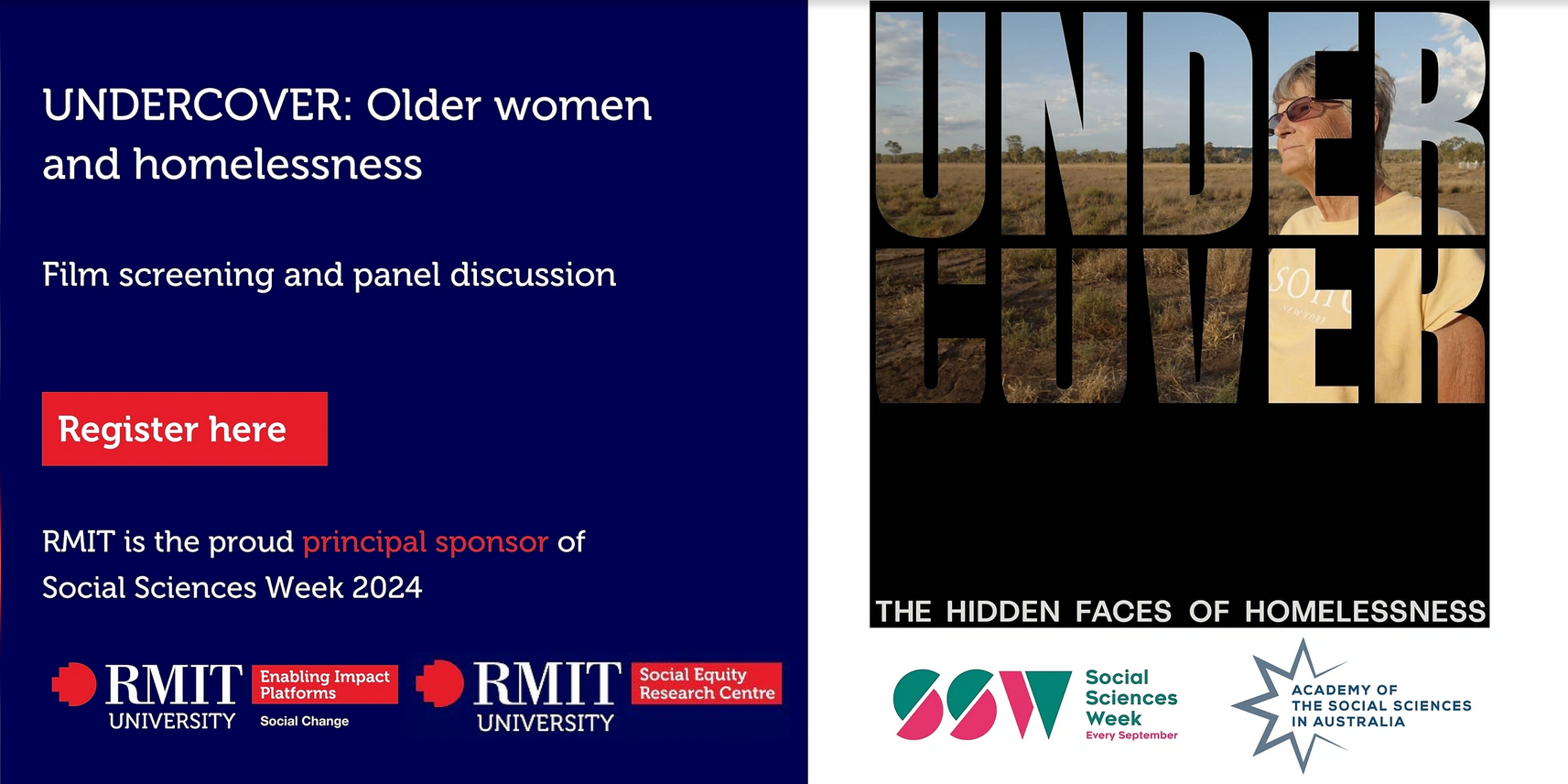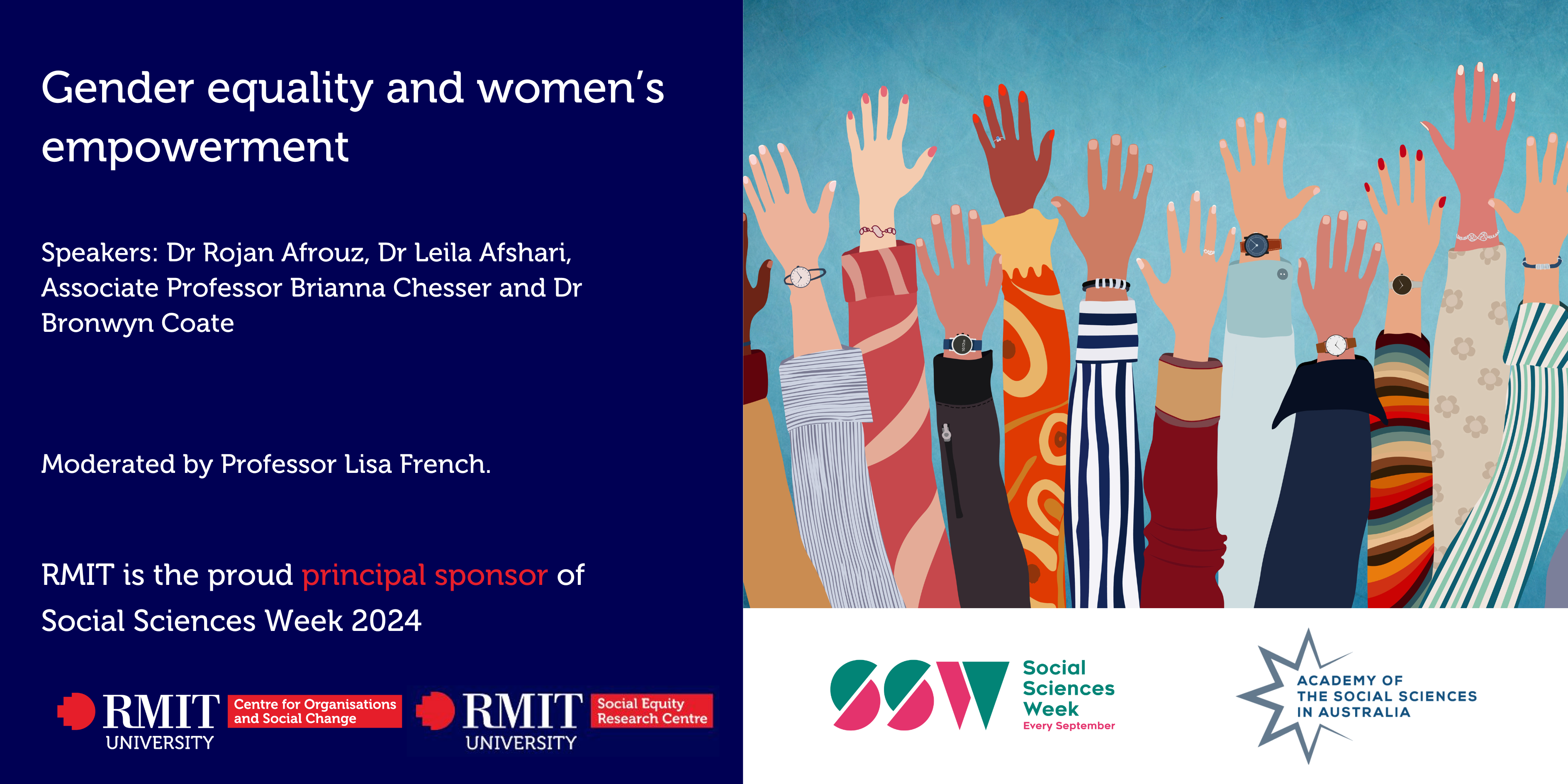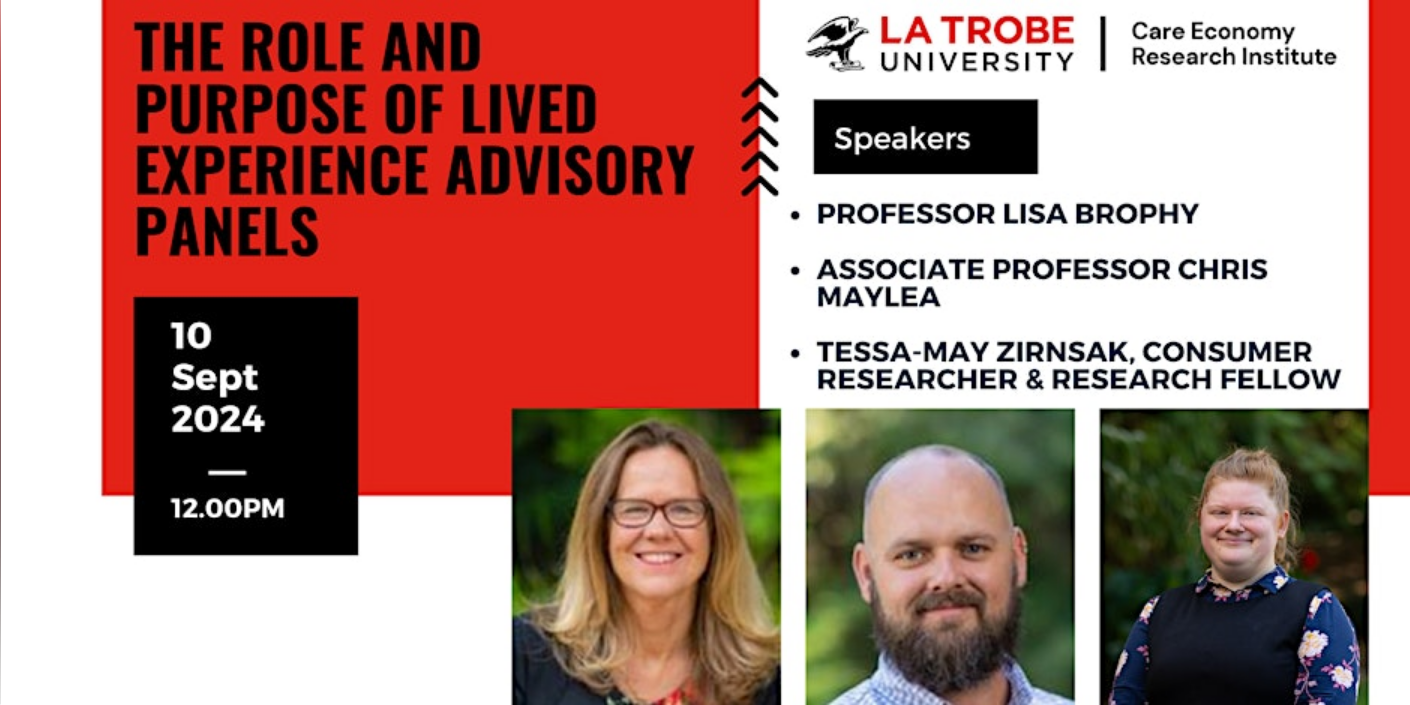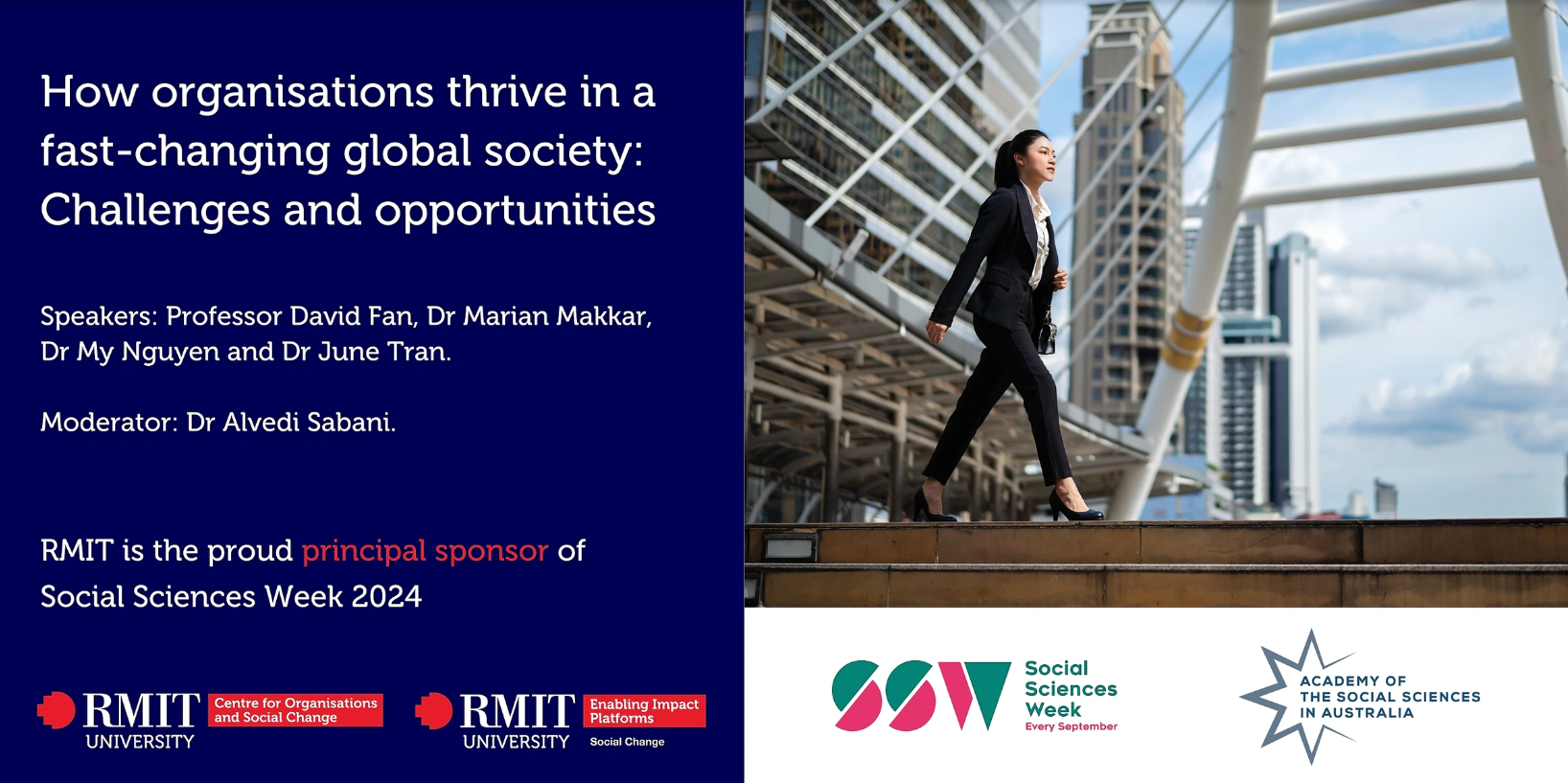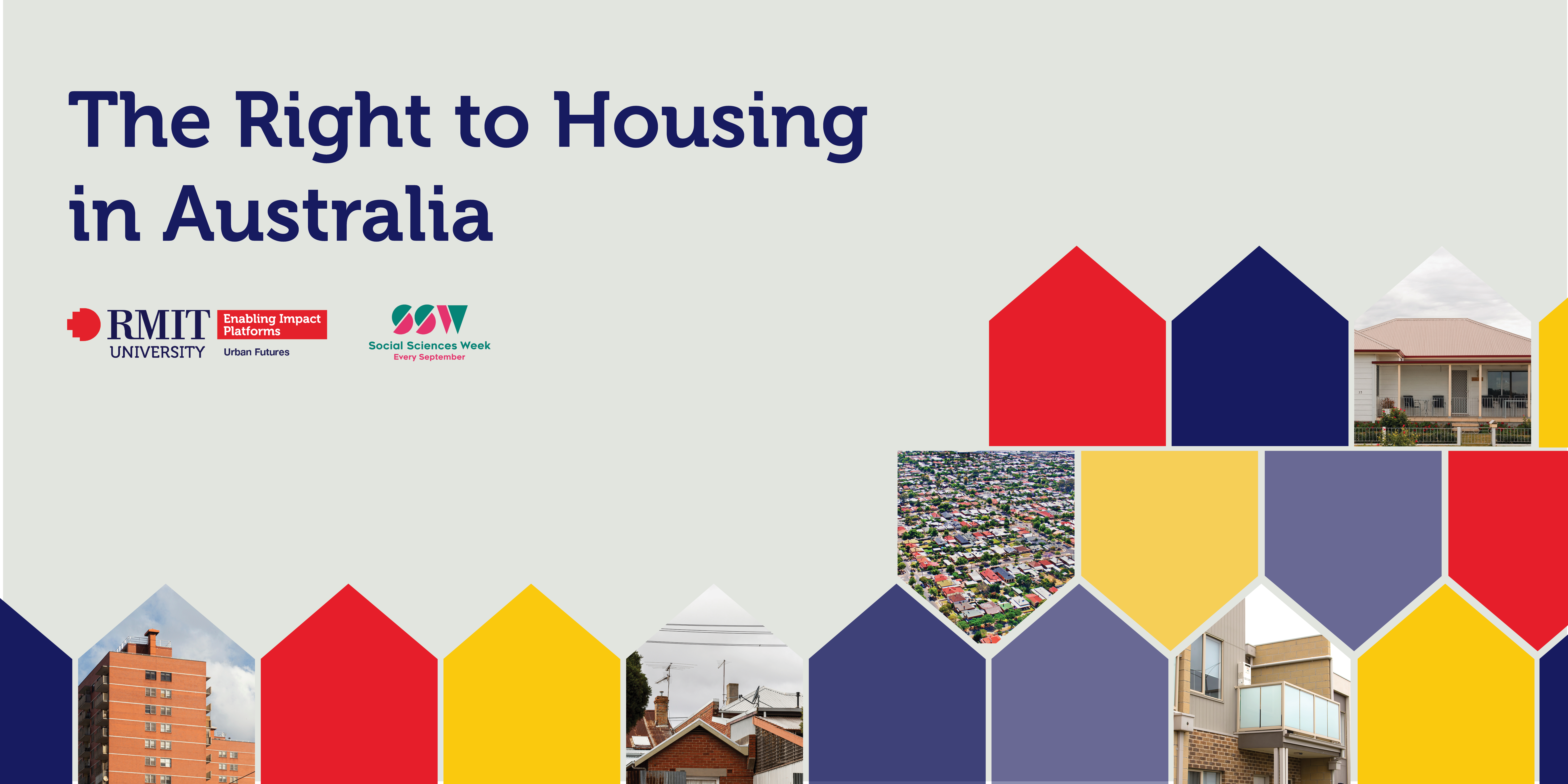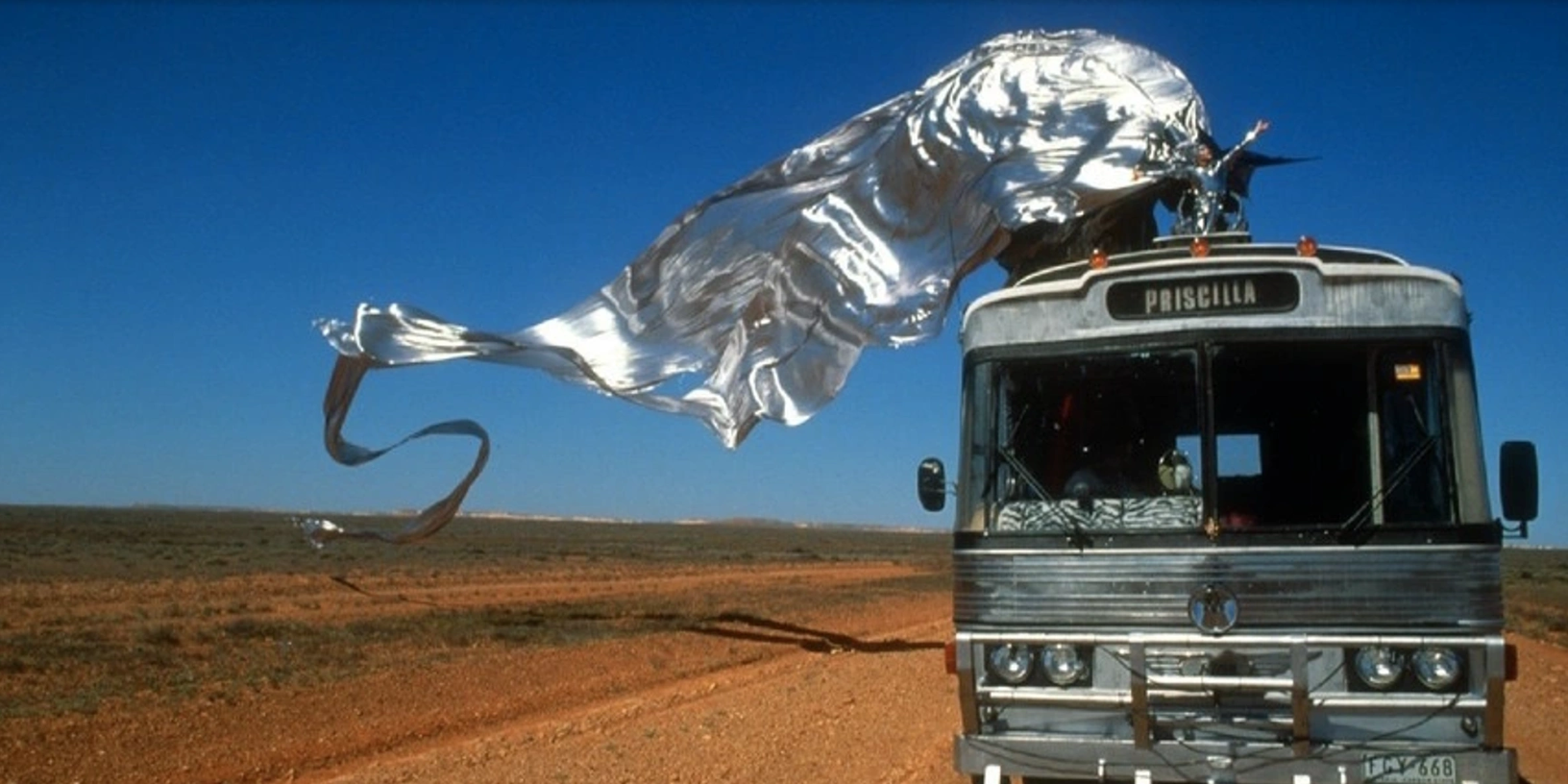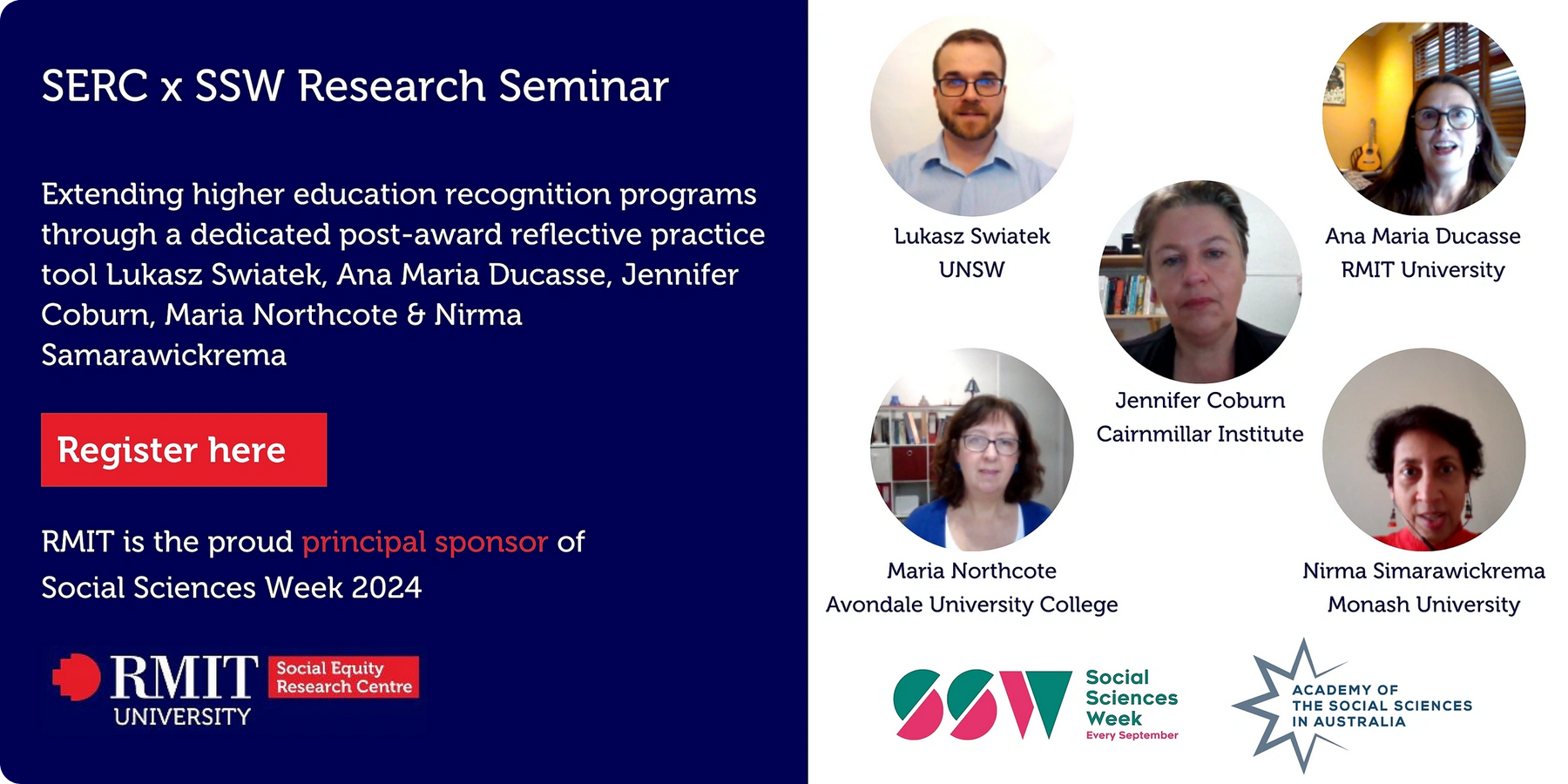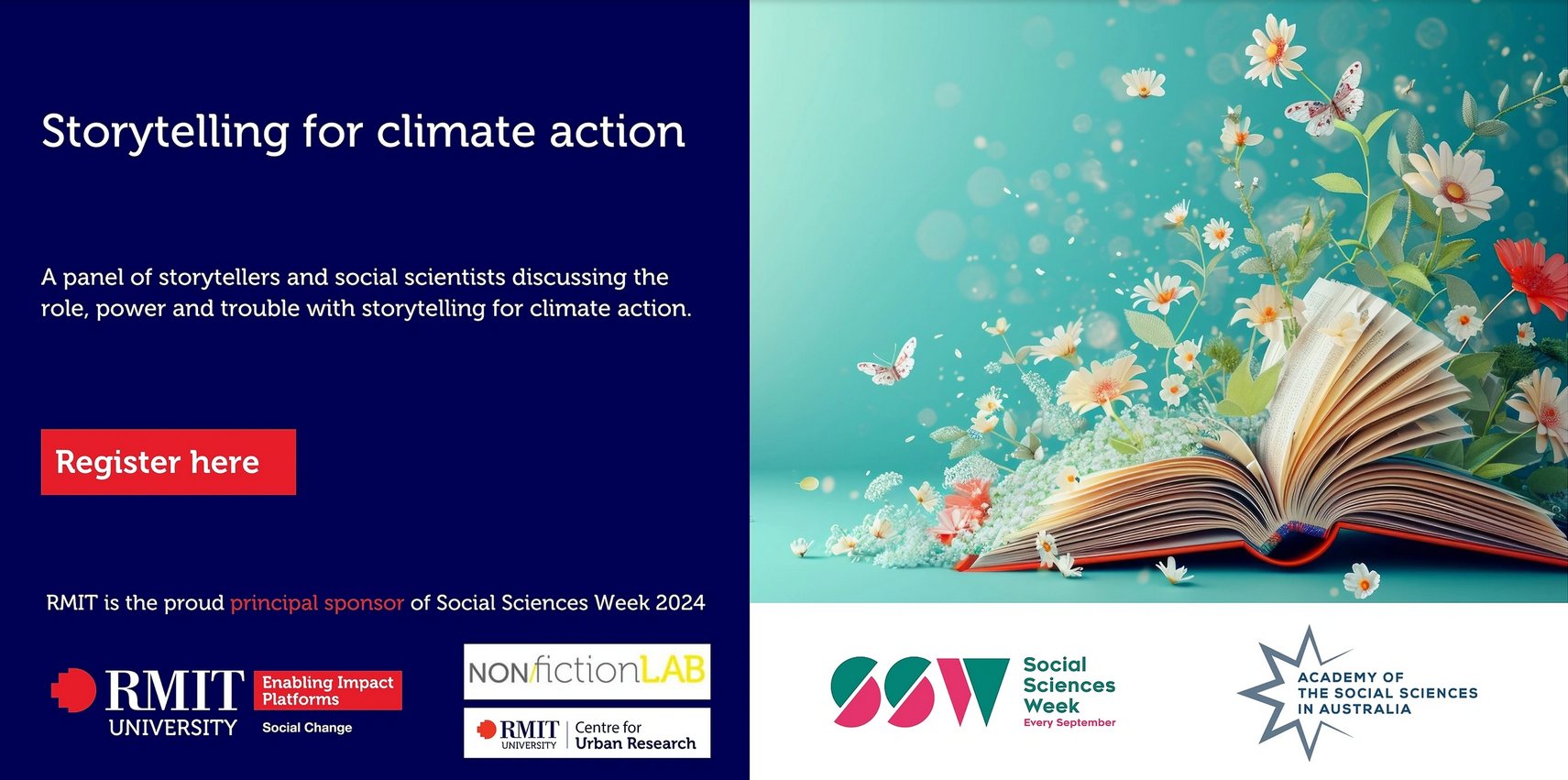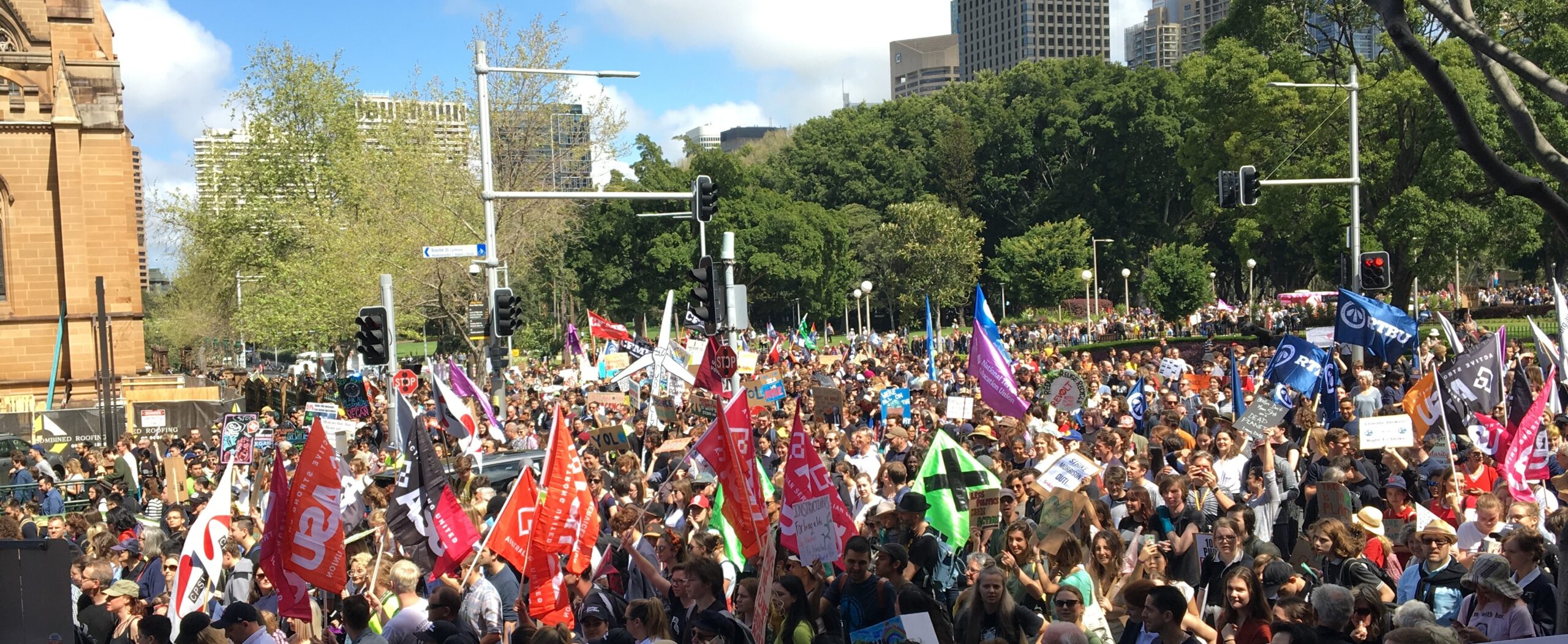Events
- Events
- Panel Discussion
Power, Privilege and Place in Australian Society
008.04.013 Megaflex 3 Building 8, 360 Swanston St, MelbourneUNDERCOVER: The Hidden Faces of Homelessness
RMIT Storey Hall Lecture Theatre, Building 16, Room 016.01.001, Level 1 342-344 Swanston Street, MelbourneThe Teaching-Research Nexus in the Social Sciences: A Panel from The University of Sydney
Room 650, Social Sciences Building, University of Sydney Science Road, Camperdown +1 moreThe Right to Housing in Australia
Green Brain The Green Brain (Level 7), Building 16, RMIT University, 336/348 Swanston St, MelbourneCelebrating 30 Years of: The Adventures of Priscilla, Queen of the Desert
The Capitol 113 Swanston Street, MelbourneWho’s on top? Inequality for the rich and poor
Macquarie University 25 Wally's Walk, North RydeQUT Commercialisation Club – Robotics and AI Investment
Room Three Sixty QUT Level 10 Y Block, QUT Gardens Point, 2 George Street, BrisbaneSolidarity and the right to protest: student encampments for Gaza
Esme Timbery Creative Practice Lab UNSW Kensington Campus, SydneyCorporations, Markets and Climate Change: Opposition or Opportunities?
Room 650, Social Sciences Building, University of Sydney Science Road, CamperdownWeek of Events
Addressing sensitive issues in the classroom
Addressing sensitive issues in the classroom
Queensland University of Technology Recorded session – available anytime Teachers cannot ignore sensitive issues. They may be circulating in the community or be part of the curriculum. For example, issues related to consent education, the Voice referendum, wars in foreign lands, climate change, nuclear power, religious discrimination and exemptions for schools, marriage equality, migration, refugees and social media influencer content can all make their ways into the classroom. How should teachers respond: Is it best to ignore issues raised if they are not part of the curriculum? Should teachers say where they stand on particular topics? Can shutting down some debates protect vulnerable students? Does the raising of issues provide important teachable moments about engaging in civil discourse? Are there some topics which should never be discussed in the classroom? How do we determine age-appropriateness for some topics? These and other questions were discussed at a recent Q&A panel consisting of academics from QUT’s School of Teacher Education and Leadership and experienced educators working in and with schools. In this recorded session our panel explores ways to respond to and engage students when sensitive issues are raised in the classroom.
Making a Difference: How Does Social Change Happen?
Making a Difference: How Does Social Change Happen?
Recorded session - available on demand Policymakers confront growing challenges in areas as diverse—and often interrelated—as climate change, social inequality, artificial intelligence, work, migration, declining biodiversity, and new threats to public health. Responses require changes or modifications to deeply entrenched social and economic structures. Consequently, reform attempts often generate conflict and resistance from those with a real or perceived interest in those structures. How can such conflict be managed to deliver urgently needed reforms? This question is central to social scientists, whose work is vital to both the implementation of effective policy, and to understanding the societal implications of policy choices. A panel of six leading social scientists analysed foundations and strategies of policy change in their areas of expertise—including some of the biggest, most difficult and pressing global and national challenges. This panel highlighted the breadth, diversity, and interrelationships within and between, social scientific and other disciplines, and their central importance to addressing these challenges. Each panellist addressed three thematic questions: What is the central conflict or problem inherent to their research topic? How can this be managed or overcome? What skills or insights enable social science to make a difference to public policy—and debate thereof—in their research field? […]
Power, Privilege and Place in Australian Society
Power, Privilege and Place in Australian Society
This event will launch the book 'Power, Privilege and Place in Australian Society', by Patrick O'Keeffe. 'Power, Privilege and Place in Australian Society' contributes to urgent discussions in key areas of Australian society. At a moment in time where a more progressive, caring, inclusive and optimistic public discourse is required, this book takes up the challenge of thinking constructively and creatively about the possibilities for change. This book is based on lectures developed for the RMIT University undergraduate course 'Australian Society in a Global Context', which was a collaborative teaching effort that drew on the expertise of numerous PhD candidates who taught in this course. To support the launch of this book, past tutors in this course will speak about their research, and identify opportunities for social change that disrupt power and privilege in Australia. Dr Stefani Vasil (Australian Catholic University) will speak about their research into experiences of gender based violence among migrant women. Dr Liam Davies (RMIT University) will discuss housing insecurity and the residualisation of public housing in Victoria. Dr Tuba Boz (RMIT University) will outline the role of sport and dance in building multiculturalism from the grassroots in suburban Melbourne. Dr Rachel Goff (RMIT University) will reflect on their work in developing culturally humble approaches […]
UNDERCOVER: The Hidden Faces of Homelessness
UNDERCOVER: The Hidden Faces of Homelessness
The Homelessness and Housing Insecurity research theme of the Social Equity Research Centre invites you to a screening of the documentary, Undercover, followed by a panel discussion, UNDERCOVER: The Hidden Faces of Homelessness Narrated by Margot Robbie and sharing the often secret lives of an eclectic group of women across Australia, UNDER COVER shines a light on the devastating reality of older women’s experiences of homelessness. UNDER COVER follows ten of these women. For these women, life hasn’t panned out the way they expected. They've lived in nice houses, worked good jobs, educated their children and then suddenly ... life unravelled and through no fault of their own, they found themselves unable to pay their rent or mortgage. The women featured in UNDER COVER, are all over 50, and are a diverse group from varied backgrounds - wealthy, poor, middle class, working, unemployed, migrant and Indigenous. Faced with the hardships of housing stress and ageing, these women are seeking to find a home to call their own, for the final chapter of their lives. Their moving but optimistic portraits reveal the struggles these women face, and lay bare the flaws in our society, as well as our economic fragility in the modern […]
Gender equality and women’s empowerment
Gender equality and women’s empowerment
This event brings together academics from across a range of disciplines to engage in meaningful discussions and collaborative efforts towards a more just and secure society for women. Join RMIT academic experts as they share knowledge, best practices, and innovative solutions to help promote and protect the rights and wellbeing of women: Dr Leila Afshari (Management) Associate Professor Brianna Chesser (Criminology and Justice) Dr Bronwyn Coate (Economics) Dr Rojan Afrouz (Social Work) Moderated by Professor Lisa French. Tuesday 10 September Time: 10.30-11.30am Online via Teams
The role and purpose of Lived Experience Advisory Panels.
The role and purpose of Lived Experience Advisory Panels.
This session will introduce participants to the important contribution Lived Experience Advisory Panels can make to research and how the decision to include a panel is grounded in a commitment to co-design and the increased expectation that experts by experience are involved in care economy research. We will discuss emerging practices including how to engage and work with a diversity of perspectives and address issues power sharing in research.
Writing out from the Academy
Writing out from the Academy
Presented by Macquarie University’s School of Social Sciences, in partnership with the Imagined Lives research collective, Sydney Review of Books, and the Centre for Applied History. Join us for a special event which brings together scholars, creative writers and publishers to discuss the practices, challenges and affordances of ‘writing out from the academy.’ Program 1.30pm-2.30pm Session One ‘The ethics and aesthetics of social science research.’ Panel discussion: Lisa Wynn, Kirsten Bell, Randa Abdel-Fattah, and Kate Rossmanith 2.30pm-3pm: Afternoon Tea 3pm-4pm: Session Two: ‘The generalised essay’ James Jiang (editor, Sydney Review of Books), with Christian Gelder and Kate Rossmanith Over the past several decades, more and more academic researchers are using different forms of writing as part of their scholarly practice. They are producing novels, short stories, nonfiction monographs, memoir, biography, literary journalism, essays and poetry. These writing innovations have been driven by the reflexive turn in the social sciences, the humanities’ interest in questions of subjectivity, artists and writers entering the academy and the acceptance of creative practice research, and, more recently, the expectation that scholars produce ‘approachable’ work that has ‘real world impact’ Researchers working with such forms of writing are confronted by particular compositional and philosophical […]
How organisations thrive in a fast-changing global society: Challenges and opportunities
How organisations thrive in a fast-changing global society: Challenges and opportunities
In an era marked by rapid technological advancements, evolving market dynamics, and unprecedented global interconnectedness, organisations are constantly navigating a landscape of both challenges and opportunities. This event will delve into the strategies and insights that enable organisations to not only survive but thrive in such a fast-changing global society. Join the following innovative academic thinkers as they explore the key factors that contribute to organisational success amidst volatility and complexity. Professor David Fan (Human Resource Management) Dr My Nguyen (Finance) Dr Marian Makkar (Marketing) Dr. June Tran (Management) Through an expert-led panel discussion, attendees will gain a comprehensive understanding of embracing cultural diversity, sustainability and corporate responsibility and global market trends and opportunities. This event is a must-attend for executives, managers, and professionals who are keen on equipping their organisations with the tools and knowledge needed to thrive in a rapidly changing world. Attendees will leave with actionable insights and practical strategies to drive their organisations forward, ensuring they remain competitive and resilient in the face of ongoing global challenges. Join us as we explore the multifaceted ways in which organisations can achieve lasting success in a fast-changing global society. Tuesday 10 September 2024 Time: 2-3pm Online via Teams
Fostering Social Cohesion: Intercultural Strategies for Strengthening Australian Multiculturalism
Fostering Social Cohesion: Intercultural Strategies for Strengthening Australian Multiculturalism
Co-hosted with Swinburne University and iGen Foundation, this webinar will explore the role of intercultural strategies in fostering social cohesion and inclusion in Australia. Australia was one of the first countries, along with Canada, to adopt multiculturalism. Over four decades later, as threats to our social cohesion grow, local, state, and federal governments are exploring how intercultural strategies can strengthen our multicultural policy framework. Please join us to hear from our distinguished panel of speakers about their work in this field. Panel Mr. Hass Dellal, Panel Chair for the Commonwealth’s Multicultural Framework Review, will discuss the role of intercultural strategies in the recently released Multicultural Framework Review. Ms. Vesna Haracic Manager, Community Diversity & Inclusion, City of Salisbury, South Australia, will discuss the groundbreaking application of intercultural strategies in the City of Salisbury, Adelaide. The panel will be chaired by Dr. Glenda Ballantyne, Senior Lecturer, Swinburne, and Co-convenor, Intercultural Cities Australian National Network. Bios Dr Bulent (Hass) Dellal AO is the Executive Director of the Australian Multicultural Foundation, Chair of the Australian Multicultural Council, the former Chair of SBS (Special Broadcasting Service) and appointed Panel Chair for the Commonwealth’s Multicultural Framework Review, May 2023. He has over 30 years of experience […]
The Teaching-Research Nexus in the Social Sciences: A Panel from The University of Sydney
The Teaching-Research Nexus in the Social Sciences: A Panel from The University of Sydney
Social Sciences Week is a celebration of research, but researchers were once students. Social Scientists do not often reflect on their days as ‘trainees’ in educational settings. In the rush to know more about the state of our societies, political systems and economies, researchers can downplay the importance of teaching the next generation of professionals, scholars and other experts. This event features several academics from the University of Sydney’s School of Social and Political Sciences, all of whom are active researchers and passionately committed teachers who will reflect on the ‘teaching-research nexus’. How does their research influence their teaching, and how does their teaching influence their research? What do they love about each of the two spheres, and how do they achieve a symbiotic relationship between them? Are there ever points of friction between research and teaching, and if so, what strategies do these academics employ to manage the inconsistencies for the benefit of students? Chair: Professor Gaby Ramia (Chair), Deputy Head of School (Research) Panel Members: Associate Professor Susan Banki, Sociology and Criminology Dr Minglu Chen, Government and International Relations Professor Alex Lefebvre, Philosophy and Government and International Relations Dr Eyal Mayroz, Sociology and Criminology Professor Brendon O’Connor, US Studies and Government and International Relations […]
The Right to Housing in Australia
The Right to Housing in Australia
With so many Australian cities facing problems of housing affordability, how can we guarantee that all Australians have access to safe, secure housing? As property prices rise, dragging rents with them, we are rapidly losing the qualities that long made Australian cities some of the most liveable in the world. Leaders and policy makers routinely propose solutions to Australia’s housing crisis, though few have led to significant change. Australian housing debates seems to be caught in stalemate at present. This session seeks new ideas by drawing together some of Australia’s leading authorities on housing policy to discuss options for the future of housing in Australian cities. Moderated by Professor Libby Porter (Director of RMIT University's Centre of Urban Research), the event will include: The Hon. Kevin Bell AO KC, Former Supreme Court Judge & Monash Adjunct Emma Dawson, Executive Director, Per Capita Jorden van den Berg, ShitRentals.com Emma Power, Western Sydney University Cameron Duff, RMIT University Learn more about the speakers. How can we restore the principles of access, affordability and fairness to our housing markets? Can we have a right to housing in Australia? How can we develop more just, inclusive and affordable housing solutions for all Australians? Please note […]
New Technologies in Contemporary Society: Promise, Peril, or Something in Between?
New Technologies in Contemporary Society: Promise, Peril, or Something in Between?
This seminar is hosted by the Sydney Centre for Healthy Societies, Discipline of Sociology & Criminology and Social Sciences Week 2024. Science and technology are embedded in almost every aspect of our daily lives. Yet too often, they are regarded as value-neutral, apolitical, and beyond democratic debate. As issues around technological sustainability, developments in generative AI, and concerns over humanity’s relationship with the environment become ubiquitous, the need to address the political and ethical dimensions of science and technology is more critical than ever before. Join us for an online lunchtime seminar with a panel of national and international early career scholars as part Social Sciences Week hosted by The University of Sydney. Our panellists will explore the often-unseen social dimensions of science and technology. From the politics of epigenetics and its connection to intergenerational trauma, to the role that generative AI might play in our visions of the future, to the ways in which technologies such as ‘waste drones’ are assisting in large-scale environmental remediation, our speakers will discuss the entanglement of contemporary life with the technological across micro and macro scales. What does it mean to live in and be governed by a technologically driven society? Whose knowledges […]
Careers for Social Science graduates
Careers for Social Science graduates
Have you wondered about what career you might pursue with your Degree? This 2-hour special event is for current students in the Bachelor of Social Science and Bachelor of Arts (major in Sociology, Gender Studies, Social Justice, Anthropology, Human Geography, Politics/International Relations). Come hear a panel discussion where alumni share insights from their career journeys. You’ll learn how they use their Degree skills and knowledge in their work, advice on how they’ve found work and information on what employers currently seek. There will be an opportunity to chat with alumni and staff over food and beverages after the panel discussion!
Celebrating 30 Years of: The Adventures of Priscilla, Queen of the Desert
Celebrating 30 Years of: The Adventures of Priscilla, Queen of the Desert
This year marks the 30th anniversary of Stephen Elliott’s 1994 masterpiece, ‘The Adventures of Priscilla, Queen of the Desert.’ To celebrate, join us for a spectacular screening at RMIT's fabulously fitting venue, The Capitol. The event will feature an introductory panel discussion with: Tim Chappel - The film's Oscar-winning costume designer Rebel Penfold-Russell - Executive producer Cerise Howard - Melbourne Queer Film Festival Program Director and esteemed film aficionado Kristy Kokegei - History Trust of South Australia Stephen Gaunson - RMIT University Since its initial screening 30 years ago, this multi award-winning film has had a significant impact on society and become internationally renowned as a symbol of freedom and support for the LGBTQIA+ community. Written and directed by Elliott, ‘Priscilla’ follows the road-tripping adventures of two drag queens and a transgender woman, played by Hugo Weaving, Guy Pearce, and Terence Stamp, as the trio cross the Australian desert from Sydney to Alice Springs. Presented in partnership with RMIT’s Social Change Enabling Impact Platform and RMIT Culture, as part of the Academy of the Social Sciences of Australia’s Social Sciences Week. Language: English Country: AUS Year: 1994 Duration: 1hr 44m Format: DCP Image credit: Still, ‘The Adventures of Priscilla, Queen […]
Securing Australian Content in the Streaming Era Summit
Securing Australian Content in the Streaming Era Summit
Three days of events across RMIT and ACMI focused on Securing Australian Content in the Streaming Era (11th-13th September) It has been nearly ten years since streaming arrived in Australia, with Stan and Netflix launching on our shores in early 2015. The Streaming Industries and Genres Network (SIGN) based at RMIT University is running three days of events to reflect on how a decade of streaming in Australia has changed the local screen entertainment landscape. Alongside research experts, come hear from screen industry leaders, policymakers, creators, and cultural commentators as we think through strategies for the next decade of streaming in Australia. Wednesday 11 September (9am-5pm): RMIT University, FREE, register above via Humanitix A series of panels will consider the current state and future of streaming video research methods, streaming diversity, and how to understand streaming audiences. Thursday 12 September (9am-5pm + screening): ACMI, $41-48, register here: Australian Content in the Streaming Era Symposium | ACMI: Your museum of screen culture Organised around key screen genres (drama, comedy, reality TV, sport, kids/youth media, and film), this ACMI partnered event features roundtable discussion panels, talks and a screening designed to catalyse conversation. We will look forward as well as back to consider how we can […]
SERC x SSW Research Seminar: Extending higher education recognition programs through a dedicated post-award reflective practice tool
SERC x SSW Research Seminar: Extending higher education recognition programs through a dedicated post-award reflective practice tool
Extending higher education recognition programs through a dedicated post-award reflective practice tool Higher education professional recognition programs, which lead to the awarding of such accolades as teaching and learning fellowships, offer participants opportunities to reflect carefully on their practice. However, few resources exist to help participants engage in reflection after the award-receiving stage. This reflection is important in helping participants not rest on their laurels and, instead, build on the practices for which they received recognition. Through a process of collaborative reflection, a group of fellowship-recipients, from different disciplines and higher education institutions, addressed this gap as stakeholder-participant-researchers by developing a transdisciplinary approach to undertaking post-award reflective practice. From this collaboration, a novel two-stage tool was developed using an iterative design methodology. The tool presented in this paper as the result of this research can be understood as a means of supporting self-paced, continued post-award reflective practice; the tool’s first stage guides users through retrospective reflection, looking back on previous achievements, while the second stage leads users through anticipatory planning, looking towards the future, to achieve fresh goals. The tool thus deepens the reflective practice of recognition program awardees and supports their ongoing professional development. This paper reports on the […]
Storytelling for Climate Action
Storytelling for Climate Action
Stories matter in climate changed worlds. They matter in how humans and non-humans dwell with, envision and respond to climate change impacts. Storytelling translates and represents lived experiences and scientific projections. In this panel, we consider the forms and roles of storytelling in shaping human relationships to climate change, environmental politics and the non-human world. We explore how science and data without stories and meaning, can lack forms of connection that lead people to act. Brought to you by RMIT University’s Centre for Urban Research and non/fictionLab, this panel brings together storytellers and social scientists engaged in critiquing and envisioning future worlds to discuss the role, power and trouble with storytelling for climate action.
Who’s on top? Inequality for the rich and poor
Who’s on top? Inequality for the rich and poor
Economic inequality shapes all our lives. But how does it play out at the top and bottom of the global economic order? This presentation uses three studies to examine this question. Hangyoung Lee will look at top wealth households in the United States and China, showing how the elite in these two countries have very different compositions. Jarvis Zhuo will present a study of one million Covid-19 deaths in the United States and show how between one in ten and one in seven deaths appear to be due to the low educational backgrounds of some of the most disadvantaged communities in the United States. Nicholas Harrigan will present a study of 10,000 residents of eight low-income villages in Cambodia, and show how inequality within villages shapes subjective wellbeing, with inequality having the most negative effects on the poorest households within these villages. Together, these three studies show the causes and consequences of inequality in a diverse range of settings, with the unifying insight that inequality changes lives and shapes the societies in which we live.
Child protection in the age of AI
Child protection in the age of AI
AI has been lauded as the next technological paradigm shift, yet it has been released to the public with little thought about its impacts on children and child sexual abuse. This panel discussion brings together expert voices from the areas of advocacy, law, policing and criminology to examine the looming challenge that AI poses to child protection. How are child sex offenders responding to the emergence of AI? What does this mean for law enforcement? Is current Australian legislation up to the task of addressing the intersection of AI and child sexual abuse? Is AI just a problem, or could it be part of the solution? Join us for a discussion at the cutting edge of children’s online safety. Facilitator: Michael Salter Professor Michael Salter conducts world-leading national and international research on child sexual exploitation, gender-based violence and complex trauma. He is the Director of Childlight UNSW, the Australasian hub of Childlight, the Global Child Safety Institute, which undertakes research for impact on child sexual abuse and exploitation. Panel: Grace Tame Grace is an activist and advocate for survivors of sexual assault. She is the founder of the Grace Tame Foundation, which aims for cultural and structural change to eradicate […]
QUT Commercialisation Club – Robotics and AI Investment
QUT Commercialisation Club – Robotics and AI Investment
FREE ENTRY Join us for an expert discussion on the state of Robotics and AI Investment in Australia Current state of robotics investment in Australia and globally - who are the main players and what are the significant trends Impact of the recently released national robotics strategy and impact on ecosystem How can researchers position themselves for commercial success HOST: Ali Buchberger - Director, Industry Engagement, QUT (Science & Engineering) GUESTS: Stefan Knight - Director of Queensland, Antler Stefan has had roles in dev, product, marketing, sales and corporate development. He has been super early (founder once, single digit employee several times), scaled-up and exited (unicorn IPO, sell off and wind down). He has also pitched for and raised capital (Seed, Series A) with the companies he has been in raising +$400M USD along the way. Professor Cori Stewart - Founder and CEO, Advanced Robotics for Manufacturing (ARM) Hub Cori Stewart is the CEO of the Advanced Robotics for Manufacturing (ARM) Hub, an Australian-first, not for profit technology commercialization company. She works in executive and advisor roles across industry, government, the research sector and through university and industry collaboration. Cori is a member of the Industry Innovation Science Australia Board and a current ‘Superstars of STEM’ […]
Solidarity and the right to protest: student encampments for Gaza
Solidarity and the right to protest: student encampments for Gaza
Join us for an insightful panel discussion on the global phenomenon of student solidarity encampments for Gaza. Australian university students erected eleven encampments in campuses across Australia. Panellists will reflect on the encampments, position them within the long and rich history of student protests and activism in Australia and globally, and explore legal questions these encampments raise in relation to the right to protect, freedom of expression, and right of assembly. Chair: Prof Ben Golder, School of Law, Society and Criminology, Faculty of Law & Justice, UNSW Ben's work is situated at the intersection of critical legal theory, contemporary political theory, and critical engagements with international law and human rights. Panel: Rand Katib, student representative and community organiser Rand is a student representative and grassroots community organiser. She was active in the Sydney University encampment Dr Elizabeth Strakosch, School of Social and Political Sciences, University of Melbourne Liz's work examines the dynamics of race and settler colonialism in public policy. She is currently an ARC DECRA fellow and co-director of the Institute for Collaborative Race Research, a board member of the Institute for Postcolonial Studies, and an Executive Officer of the Jewish Council of Australia. Prof Luke McNamara, School of […]
Climate contestation: mobilisations, intersections, possibilities
Climate contestation: mobilisations, intersections, possibilities
UTS Global Goals Month and ASSA Social Sciences Week 2024 UTS Annual Andrew Jakubowicz Lecture Climate contestation: mobilisations, intersections, possibilities Friday 13 September 12noon-130pm Online event, free registration: here With advancing climate change there are new convergences, both against climate action and for it. What intersectional alignments emerge? How does this shift politics, local and transnational? What barriers and possibilities are created? This Social Science Week Roundtable reflects on the state-of-play as society responds to climate disruption. Chair: Chris Ho (UTS) Presenters: James Goodman (UTS) - Is society 'climatizing'? Heidi Norman (UNSW) - Indigenous Peoples and climate change Priya Pillai (UTS/ASAR) - View from India - Global South climate justice Jon Marshall (UTS) - The conservatives: anti-renewables and the nuclear lobby Michelle Catanzaro (WSU) - Youth climate protest Julia Scott-Stevenson (UTS) - Diverse imagination and climate futures Discussant: Andrew Jakubowicz (UTS) There will be short contributions followed by Chair-moderated discussion. The forum will be in zoom meeting room format to allow participants to directly contribute. The meeting will be recorded and edited to publish on UTS Central News. Hosted by Social and Political Sciences discipline, FASS UTS, with the Climate, Society and Environment Research Centre (CSERC). Further info: James Goodman, james.goodman@uts.edu.au
Corporations, Markets and Climate Change: Opposition or Opportunities?
Corporations, Markets and Climate Change: Opposition or Opportunities?
Corporations and capitalism are often blamed for environmental problems, and on climate change we are often told that there needs to be a ‘balance’ between economic and environmental outcomes. This suggests they are mutually contradictory, and therefore that the environmental damage resulting from economic imperatives must somehow be accommodated. On the other hand, there is enormous potential for business to drive the solutions necessary for decarbonising our economy given the economic motivators to do so through markets. One reason why this is not stressed as much as it could be is that those benefitting from the status quo are in a position to politically frustrate the changes necessary, while for often ideological reasons others believe that the government must take the lead. The presenters on this panel tease out the opposition and opportunities involved in such debates. Speakers: John Mikler (Chair) and Imogen Ryan: Gaslighting Australia: The Instrumental Power of Australia’s Mining and Energy Industries John Mikler is an Associate Professor in the Department of Government and International Relations at the University of Sydney. He researches corporations' relations with states, civil society and international organisations, as well as how they are political actors in their own right. He has published […]

